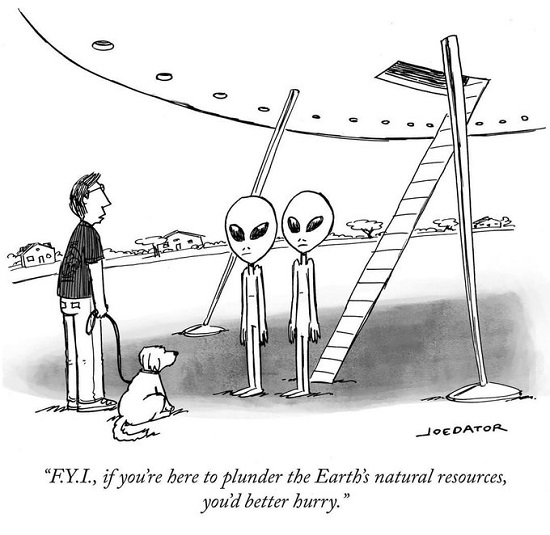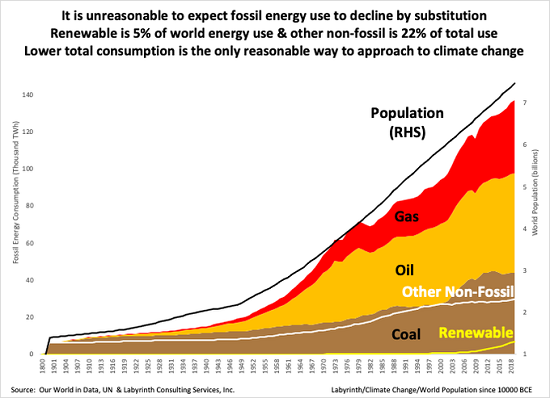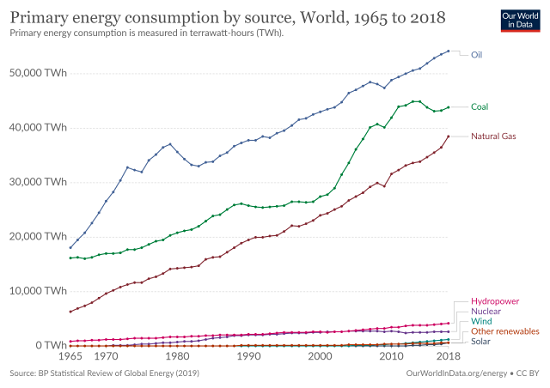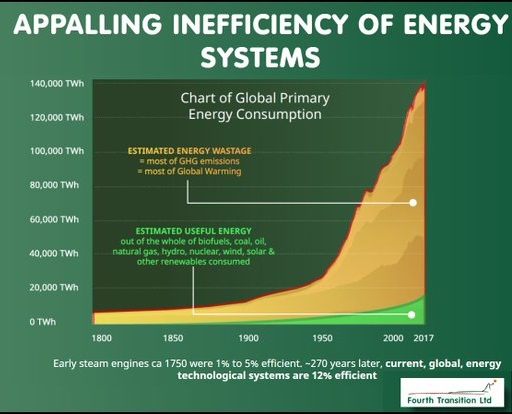Magical Thinking About Green Energy
The incentives must change from
"waste is growth" to hyper-efficiency, conservation, right to repair and manufactured objects
engineered to last a generation or longer and be recyclable at scale.
Humans like novelty but don't like change. It's easy to confuse the two. When we say,
"I need a change," what we mean is "I'd like to be refreshed by some novelty," not "I want all the
uncertainty, ambiguity and potential for errors and losses that come with change."
Humans like a new model of truck (novelty) but don't like their truck is taken away (change).
Since life is change, we all some experience with it. Some changes happen to us, others are the result
of conscious choices we make.
Every individual has a mix of aptitudes, strategies and experiences with both kinds of change.
Some of us are better at handling one kind or the other, some don't handle either very well, some
handle all change remarkably well.
Very few of us say, "I sure would like to have a health crisis." We don't choose the health crisis,
but we do choose our response.
Like many of you, I've had accidents (health crises), major career changes and multiple moves to
different locales.
as a general rule, changes we choose / direct have a push-pull aspect: there's something negative we
want to avoid or end, and something positive we want to obtain.
For example, we might realize that our current job is a dissatisfactory dead-end (the negative) and
we need a more satisfying career (the positive).
A health crisis is negative but the prospect of this being a catalyst for a healthier lifestyle is positive.
Being fired or losing our job is negative (not the change we wanted or chose) but once we accept that
our life is going to change one way or the other, we can view this negative as a positive catalyst--
a move we didn't choose for various reasons, but a positive move because otherwise we wouldn't have
taken all the risks and uncertainties that go with fashioning another career.
As a species, humanity is approaching the end of the past 200 year period of expansion of energy consumption.
In the initial stages of this vast expansion, much of the new energy went into positive improvements:
rural electrification, enormous leaps in food production and healthcare, and so on.
But beyond a certain point, energy and resources are being spent on consumption rather than investment,
what I call "waste is growth:" once we set energy / resource consumption as the measure of prosperity,
vehicles burning fuel in traffic jams, food that has been thrown out, half-empty aircraft and so on are
viewed as positive "growth" because more fuel and resources were consumed.
Needless to say, waste is not growth, it's squandering precious resources.
Humans habituate to new conditions with remarkable ease. Conditions that are initially horrific
(Gulag prison camps, etc.) are soon just "everyday life."
So humans have habituated to "waste is growth" and consider wasting energy and resources perfectly
normal and desirable, as waste is more convenient than conservation and efficiency.
When humans are told 1) hydrocarbons are a limited resource that will soon become more expensive to
extract and 2) burning hydrocarbons is ruining the biosphere we all depend on, few humans think "gosh,
we should use much less energy."
Instead, they think, "Let's replace those 30 billion barrels of oil, the 30 billion (equivalent) barrels
of natural gas and the 30 billion (equivalent) barrels of coal we burn every year with "green energy"
that doesn't pollute the biosphere with greenhouse gases and other negative consequences."
Since humans don't like change but they do like novelty, it's very easy to anticipate electric-powered
air-taxis (small helicopters), a billion all-electric vehicles, etc., all powered by "green" "renewable"
energy sources such as wind turbines and solar panels.
The transition away from hydrocarbons won't require any sacrifices or inconvenience, it will be a seamless
transition from the petroleum-fueled vehicle to the electric vehicle, from gas-fired generators to
solar/wind and batteries, and so on.
Everything in the new energy system will naturally be recyclable.
Unfortunately, the anticipated seamless transition to all renewable energy is magical thinking in
virtually every way.
Renewables are not actually renewable, they wear out and must be replaced, so they are "replaceable"
not "renewable."
All these "replaceable" energy sources consume staggering amounts of minerals, metals and energy to
be constructed, maintained, and replaced every 10 to 20 years. (The theoretical lifespan is claimed
to be 30 years, but the real-world lifespan is consequentially less.)
Since all these "replaceable" energy sources are diffuse and intermittent, the energy they generate
fluctuates across a wide range and must be concentrated to be stored /used in batteries or mechanical
storage (reservoirs with hydro-powered generators, etc.) or chemical storage (converting electricity
into hydrogen to be used as a fuel).
The billions of batteries required to store all this electrical energy must also be replaced every
decade or so, and recycling batteries is difficult and costly. There is nothing remotely "green"
about mining the planet for lithium, cobalt, etc. or manufacturing billions of batteries.
"Let’s Not Blow Up a Mountain and Call It Green"
As for recycling: a tiny percentage of the "replaceable" energy sources or batteries are being recycled
because it's too difficult and costly.
The scale required to replace 90 billion barrels of hydrocarbons with diffuse, intermittent energy
sources and batteries is difficult to grasp.
Here is the reality:
"The annual output of Tesla's Gigafactory, the world's largest battery factory, could store three minutes'
worth of annual U.S. electricity demand. It would require 1,000 years of production to make enough
batteries for two days' worth of U.S. electricity demand. Meanwhile, 50–100 pounds of materials are
mined, moved, and processed for every pound of battery produced."
This report succinctly summarizes the physical limits of wind and solar efficiencies and the
impossibility of replacing all hydrocarbons with energy sources that require millions of tons of minerals,
metals, concrete, etc., are not recyclable and that must be replaced every generation.
The "New Energy Economy": An Exercise in Magical Thinking
This report summarizes why it's impossible to obtain all the minerals/metals required:
The Mining of Minerals and the Limits to Growth
The Delusion of Infinite Economic Growth:
Even "sustainable" technologies such as electric vehicles and wind turbines face unbreachable
physical limits and exact grave environmental costs.
If you prefer a video presentation, Nate Hagens compresses 15 years of research into 2 hours and 50 minutes:
Earth and Humanity: Myth and Reality (2:50 hours)
There are many other resources that report the same physical realities: mining, smelting and
transporting the millions of tons of materials required will be catastrophic for the environment,
as it can only be accomplished by burning hydrocarbons and laying waste to the planet.
As for nuclear power: India has invested billions of dollars and years in trying to complete a
full-scale thorium reactor, so far without success; to replace all hydrocarbon energy with
nuclear-generated electricity ,the U.S. would have to bring a new reactor online every week for years.
There hasn't been a single new reactor built in decades, so this is the acme of magical thinking.
It's much easier to sell change if it's easy, convenient, cheap and doesn't require sacrifices. But
this is not how change works.
How change we don't choose works is: "you had a heart attack and almost died. If you want to live
longer than a few months, you'll have to completely change your lifestyle, diet and fitness."
Unfortunately, there is virtually nothing easy, convenient or cheap that doesn't require sacrifices
about changing your lifestyle from the ground up.
To make the necessary changes, we have to fashion a positive view and different incentives and goals:
rather than put mouthfeel and taste above all else, we re-set the incentives to eating the healthiest
foods in the tastiest ways. Rather than find excuses for not exercising, we find a form of exercise
we like (or at least can tolerate) and that can be folded into a new habit.
We all understand the appeal of magical thinking: rather than go through all the hard work of remaking
our lifestyle and daily habits, we put our faith in a "miracle diet" or equivalent.
Humanity's resistance to needed change is understandable, but the irony is we quickly habituate to
whatever changes force themselves on us.
That's our choice with energy and the post-hydrocarbon era ahead. The incentives must change from
"waste is growth" to hyper-efficiency, conservation, right to repair and manufactured objects
engineered to last a generation or longer and be recyclable at scale.
If we can choose a positive vision and change our incentives and goals, we'll look back and wonder
why we clung so fiercely to magical thinking and "waste is growth."




If you found value in this content, please join me in seeking solutions by
becoming
a $1/month patron of my work via patreon.com.
My new book is available!
A Hacker's Teleology: Sharing the Wealth of Our Shrinking Planet
20% and 15% discounts (Kindle $7, print $17,
audiobook now available $17.46)
Read excerpts of the book for free (PDF).
The Story Behind the Book and the Introduction.
Recent Videos/Podcasts:
Charles Hugh Smith on Secular Inflation (Host Richard Bonugli, 31 min)
My COVID-19 Pandemic Posts
My recent books:
A Hacker's Teleology: Sharing the Wealth of Our Shrinking Planet
(Kindle $8.95, print $20,
audiobook $17.46)
Read the first section for free (PDF).
Will You Be Richer or Poorer?: Profit, Power, and AI in a Traumatized World
(Kindle $5, print $10, audiobook)
Read the first section for free (PDF).
Pathfinding our Destiny: Preventing the Final Fall of Our Democratic Republic
($5 (Kindle), $10 (print), (
audiobook):
Read the first section for free (PDF).
The Adventures of the Consulting Philosopher: The Disappearance of Drake
$1.29 (Kindle), $8.95 (print);
read the first chapters
for free (PDF)
Money and Work Unchained $6.95 (Kindle), $15 (print)
Read the first section for free (PDF).
Become
a $1/month patron of my work via patreon.com.
NOTE: Contributions/subscriptions are acknowledged in the order received. Your name and email remain confidential and will not be given to any other individual, company or agency.
|
Thank you, Roderick M. ($100), for your outrageously generous contribution to this site -- I am greatly honored by your support and readership. |
Thank you, Charles M. ($10/month), for your outrageously generous pledge to this site -- I am greatly honored by your steadfast support and readership. |
|
|
Thank you, Laura R. ($54), for your magnificently generous contribution to this site -- I am greatly honored by your support and readership. |
Thank you, Jim B. ($5/month), for your splendidly generous pledge to this site -- I am greatly honored by your steadfast support and readership. |























